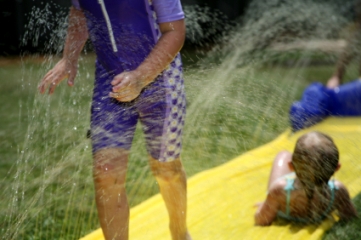No doubt about it: Time for unstructured play is dwindling. There are many reasons why this is so: We're working more hours. We're spending more time "plugged in" to TV, phones, video games, and the Internet. Kids have more homework than ever. And as a society we seem to have decided that structured activities - academic, athletic, and otherwise - are more beneficial than play.
In my new book, Teach Your Children Well: Parenting for Authentic Success, I explain why a lack of play exacts a heavy price on kids. If you're ready to change your high-pressure, overscheduling ways, summer is the perfect time to get started.
Here's how:
1. YOU have to buy in to the belief that play is important.
Unfortunately, this is tough for many parents. We're steeped in a culture that elevates work and downplays play. When we see our daughter dancing around the living room we think, She's so talented! She needs dance lessons! But the minute you do this it stops being play.
Read up on the evidence about play. You'll find it's far more valuable than force-feeding children "education" at a young age. Research shows that children who attend play-based preschools, as opposed to academic preschools, do significantly better in school down the line. Baby Einstein actually retards, rather than advances, language acquisition. Once you realize that your assumptions are wrong, you'll be motivated to change your parenting practices.
2. Think back to your own best memories from childhood.
They won't be the classes or the lessons but the time you were allowed to just be. It's important to a llow your kids this right as well. Children deserve a childhood.
llow your kids this right as well. Children deserve a childhood.
3. Get back in touch with your own playfulness.
Maybe you haven't really had fun in a long time. Decide this is the summer you're going to change that. Get in the pool with your kid. Go camping. Dust off your bicycle and go for a spin. When your child sees you playing, she will be more willing to play, too.
Kids really do model what they see. Plus, part of your job is to present a picture of adulthood that your children will want to emulate. If all they see you doing is working, or sitting around watching them play baseball, why would they ever want to grow up?
4. Explain to your kids that you're going to "back it off" a bit this summer.
Tell them you're worried that they're too busy to really have any fun and that you want to help them change that. Then, ask them to help you create a summer "bucket list." What would they really like to do this summer?
Don't be surprised if they don't know how to answer that question. If they've been overbooked and overscheduled all their lives, they're not used to thinking this way. Part of the joy of this summer will be in seeing their sense of play emerge.
4. Ask them which activities they want to keep ... and which they want to toss.
Gently explain to them that swimming, Scouts, gymnastics, and twice-a-week piano lessons is too much "doing" for this laid back summer. Ask them to figure out their least favorite activity (or maybe two) and then cancel it.
You may be shocked by what they tell you they want to quit doing. If your son has been on the swim team for several years and seems to love it, you may be shocked when he asks to quit. Sometimes our kids do things because we want them to, and somehow we failed to notice their heart has never been in it.
5. Pencil in some low-key friends and family time.
This may mean saying no to some invitations. Or it may mean setting aside one evening as family night. Just make sure kids have substantial blocks of time to just hang out with you or with friends. (Surprise...even video games aren't that bad in limited quantities.)
The point is to make sure there is plenty of free time available for the kids to just be kids. If you don't set aside the time, and guard it with your life, you'll just end up keeping your usual chaotic schedule by default.
6. Encourage free-range (not pre-packaged) play.
The more natural and spontaneous the play is the better. A sandbox in the backyard is better than an amusement park. Blocks are better than a plastic bat cave. Impromptu games of neighborhood soccer are more valuable than soccer camp.
7. Be aware that loafing and hanging out are more valuable than you think.
The next time you're tempted to tell your kid, "Why don't you go do something!" rethink your belief that busy is always better. Even if it doesn't look like kids are doing much, a lot of learning may be going on. Never underestimate the value of lying in the grass looking at the sky, or sitting on the sidewalk sharing a stick of gum with a friend.
8. Finally, trust your kids enough to give them some freedom.
Choice is the hallmark of true play. Have confidence that when your child is off on his own and enjoying himself and directing himself in activities he chooses...well, that is his job. Chances are, whatever he's doing of his own free will is better than any "enriching" activity you might impose on him.
 Madeline Levine, PhD, is a clinician, consultant, and educator; the author of New York Times bestseller, The Price of Privilege and Teach Your Children Well, and a cofounder of Challenge Success, a program founded at the Stanford School of Education that addresses education reform and student well-being. She lives outside San Francisco with her husband and is the proud mother of three newly minted adult sons.
Madeline Levine, PhD, is a clinician, consultant, and educator; the author of New York Times bestseller, The Price of Privilege and Teach Your Children Well, and a cofounder of Challenge Success, a program founded at the Stanford School of Education that addresses education reform and student well-being. She lives outside San Francisco with her husband and is the proud mother of three newly minted adult sons.
Her new book, Teach Your Children Well: Parenting for Authentic Success (HarperCollins, July 2012, ISBN: 978-0-0618247-4-6, $25.99) will be available at bookstores nationwide and from all major online booksellers. It is now available for pre-order online. For more information, please visit www.madelinelevine.com.









